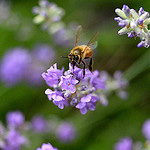Sustain Ontario Statement on Ontario’s Pollinator Strategy
Posted: June 30, 2015
Categories: News from Sustain Ontario

Credit: Patty O’Hearn Kickham, shared via Flickr with Creative Commons license.
On May 28, 2015, Sustain Ontario joined Jean-Marc Bonmatin, researcher at the French National Centre for Scientific Research (CNRS) and vice-chair for the international Task Force on Systemic Pesticides, at a Queen’s Park press conference organized by the David Suzuki Foundation. Bonmatin was invited to Toronto to share key findings as Ontario prepared regulations to restrict certain uses of neonics. The following statement was delivered by Carolyn Young. Learn more about the press conference coordinated by the David Suzuki Foundation: International neonicotinoid expert presents findings in Toronto.
Good morning and Thank you to Lisa and the David Suzuki Foundation for inviting me to speak on behalf of the Sustain Ontario alliance.
Sustain Ontario is an alliance of over 80 organizations and businesses from across the province working together towards a healthier food and farming system in Ontario.
I am happy to be here at Queen’s Park on a such a beautiful day. Next week, I will be here on the exact same lawn for the Queen’s Park farmers’ market celebrating the second Local Food Week in Ontario.
Sustain Ontario is proud of the fact that we are in a province that had the foresight to enact the first Local Food Act in Canada–a bill that was supported by all political parties. They understood the role that food can play in connecting rural and urban Ontario and building a resilient province for future generations.
The Local Food Act recognizes the importance of investing in a food system that is healthy, ecological, equitable AND financially viable. It also recognizes that to achieve such a food system, strict targets must be set and a strategy developed to move towards those targets in a thoughtful and deliberate way.
But Local Food is not something that just happens–it relies on two fundamental things:
- a healthy, resilient ecosystem that contributes clean water, energy and nutrients to the foods we eat; and
- dedicated stewards of the land–our farmers–who have a depth of skills and knowledge to contribute
Without either of these two things, our local food system will collapse.
Pollinators–not just honeybees but the wide diversity of insects and birds that pollinate our crops-play a vital role in this system. They, like farmers, are busy getting things done in the background so that the rest of us can eat. They contribute over 2 billion dollars a year to Canadian agriculture through pollination services and would cost us much, much more if they were to be replaced by workers paid to hand pollinate individual plants. Imagine how much our food would cost us then.
We believe at Sustain Ontario that the proposed Pollinator Strategy is a sensible one that takes both the livelihoods of farmers and pollinators into consideration. We are grateful to the Ontario government for showing considerable leadership on such a complex issue.
Our members know from experience that it’s possible to grow food in a way that builds healthy soil, contributes to biodiversity, helps to mitigate the effects of climate change AND…. makes money. Neonicotinoid treated seeds have been shown to have little to no benefit on yields (less than 0.4% for soy, approx. 4% for corn) and yet 99% of corn seed in Ontario is treated.(1) Where is the value in that?
We also know that restrictions are not the only way to promote pollinators and best practices in agriculture.
Investments in research and education, transitions to organic agriculture and better extension services for farmers across the province are critical to fostering innovative leaders who are growing both Healthy Environments AND a Healthy Economy.
As a movement of farmers and eaters who envision a better food system, we urge all parties to support this important step forward in protecting the health of pollinators and the future of our food.
References
(1) The Western Producer. Neonicotinoids provide almost zero economic benefits in soy crops: Health Canada. May 22, 2015.
2 responses to “Sustain Ontario Statement on Ontario’s Pollinator Strategy”
Leave a Reply
You must be logged in to post a comment.

[…] UPDATE (June 30, 2015): Read Sustain Ontario’s full statement. […]
[…] Sustain Ontario’s Carolyn Young spoke on behalf of the alliance at a press conference at Queen’s Park on May 28th before the regulations were announced: “Without pollinators or farmers, there is no local food. That’s why we believe at Sustain Ontario that the proposed Pollinator Strategy is a sensible one that takes both the livelihoods of farmers and pollinators into consideration.” You can read her comments here. […]